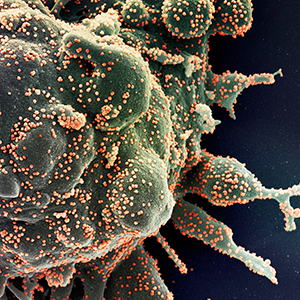To study heterogeneity in SARS-CoV-2 IgG response titre in patients recovered from COVID-19

Published: September 28, 2021
Abstract Views: 1251
PDF: 494
Publisher's note
All claims expressed in this article are solely those of the authors and do not necessarily represent those of their affiliated organizations, or those of the publisher, the editors and the reviewers. Any product that may be evaluated in this article or claim that may be made by its manufacturer is not guaranteed or endorsed by the publisher.
All claims expressed in this article are solely those of the authors and do not necessarily represent those of their affiliated organizations, or those of the publisher, the editors and the reviewers. Any product that may be evaluated in this article or claim that may be made by its manufacturer is not guaranteed or endorsed by the publisher.
Similar Articles
- Laura Crespi, Monica Bosco, Naika Scalabrino, Massimo Baravelli, Anna Picozzi, Andrea Rossi, Melania Romano, Daniela Imperiale, Silvana Borghi, Elisabetta Brunello, Claudio Anzà , Intensive physiotherapic respiratory care in critically ill patients with tracheostomy after cardiac surgery , Monaldi Archives for Chest Disease: Vol. 72 No. 3 (2009): Cardiac series
- A.M. Moretti, S. Tafuri, D. Parisi, C. Germinario, Epidemiology of Pulmonary Embolism in Apulia from analysis of current data , Monaldi Archives for Chest Disease: Vol. 73 No. 1 (2010): Pulmonary series
- Gianaugusto Slavich, Paola Mapelli, Rudy Fregolent, Massimo Slavich, Duilio Tuniz, Non ST ergometric variables in the diabetic patient and their prognostic significance , Monaldi Archives for Chest Disease: Vol. 74 No. 1 (2010): Cardiac series
- Vincenzo Capuano, Norman Lamaida, Sergio Torre, Ernesto Capuano, Maria Immacolata Borrelli, Eduardo Capuano, Maria Maddalena Clarizia, Rocco Capuano, Carmela De Rosa, Ten year cardio-cerebro-vascular mortality and morbidity in a Southern Italy cohort: the VIP Project data , Monaldi Archives for Chest Disease: Vol. 80 No. 1 (2013): Cardiac series
- Gabriela Lima de Melo Ghisi, Cláudia Medeiros Leite, Marinella Sommaruga, Magnus Benetti, Information about secondary prevention in coronary patients: a comparison between Italian and Brazilian Application of MICRO-Q Questionnaire , Monaldi Archives for Chest Disease: Vol. 74 No. 1 (2010): Cardiac series
- O. Resta, P. Carratù, A. Depalo, T. Giliberti, M. Ardito, O. Marrone, G. Insalaco, Effects of fixed compared to automatic CPAP on sleep in Obstructive Sleep Apnoea Syndrome , Monaldi Archives for Chest Disease: Vol. 61 No. 3 (2004): Pulmonary series
- C. May, A. Greenough, Corticosteroids in infant chronic lung disease , Monaldi Archives for Chest Disease: Vol. 61 No. 3 (2004): Pulmonary series
- Salvatore Andrea Sciurello, Francesca Graziano, Maria Marcella Laganà, Elena Compalati, Gabriele Pappacoda, Simone Gambazza, Jorge Navarro, Pietro Cecconi, Francesca Baglio, Paolo Banfi, Feasibility of high-frequency percussions in people with severe acquired brain injury and tracheostomy: an observational study , Monaldi Archives for Chest Disease: Early Access
- R.W. Dal Negro, A. Testa, R. Aquilani, S. Tognella, E. Pasini, A. Barbieri, F. Boschi, Essential amino acid supplementation in patients with severe COPD: a step towards home rehabilitation , Monaldi Archives for Chest Disease: Vol. 77 No. 2 (2012): Pulmonary series
- S. Bertini, M. Picariello, M. Gorini, T. Renda, A. Augustynen, G. Villella, G. Misuri, N.M. Maluccio, R. Ginanni, D. Tozzi, A. Corrado, Telemonitoring in chronic ventilatory failure: a new model of survellaince, a pilot study , Monaldi Archives for Chest Disease: Vol. 77 No. 2 (2012): Pulmonary series
<< < 17 18 19 20 21 22 23 24 25 26 > >>
You may also start an advanced similarity search for this article.

 https://doi.org/10.4081/monaldi.2021.1943
https://doi.org/10.4081/monaldi.2021.1943





